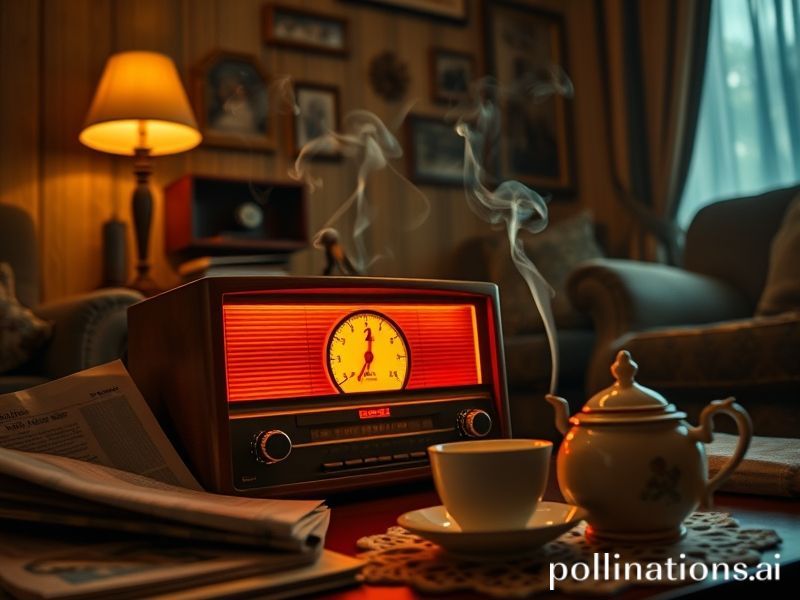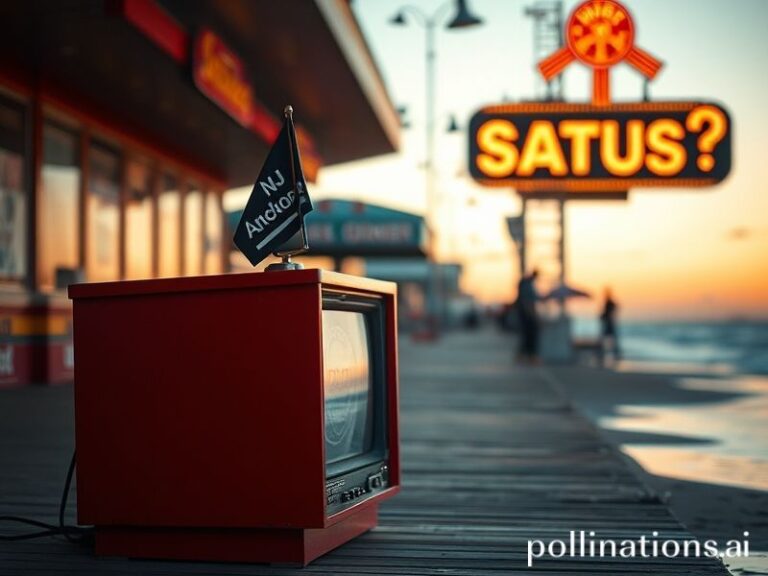Radio 2: The Last Imperial Broadcast—How Britain’s Middle-Aged Mixtape Just Might Rule the World
The BBC’s Radio 2, that venerable sound-track to British middle age, has lately become a diplomatic incident waiting to happen. From Jakarta to Johannesburg, expats tune in via VPNs, pretending the shipping forecast still concerns them, while governments from Brasília to Beijing monitor its playlist for signs of imperial relapse. After all, when a 55-year-old pop station quietly drops a Michael Jackson track and half the Commonwealth starts chain-smoking on balconies, you know soft power is still the hardest currency going.
Globally, Radio 2 is less a radio station and more a floating cultural aircraft carrier. Its morning presenters—cheerful as undertakers on commission—deliver weather and traffic in tones once reserved for royal births. Somewhere in the Azores, a retired naval officer hears “Sailing By” and instinctively salutes, spilling his poncha. Analysts at the Atlantic Council now chart Elton John rotation rates the way Cold War Kremlinologists counted missiles on Red Square parade ramps. If “Crocodile Rock” appears twice in one afternoon, Estonia reportedly moves a battalion closer to Narva. Coincidence? The Estonians don’t think so.
The station’s secret weapon is its uncanny ability to weaponise nostalgia. In Lagos, Uber drivers stream it to soothe passengers stuck in danfo-induced gridlock; the resulting calm reduces surge pricing by 12 percent, according to a World Bank memo nobody was supposed to leak. Meanwhile, in Toronto, condo developers pipe Radio 2 into lobbies to convince buyers that overpriced shoeboxes are actually English country cottages. Sales of faux-Tudor beams have quadrupled. Somewhere, George Orwell’s ghost updates his manuscript: “Imagine a boot stamping on a human face—forever—while Chris Evans reads out dedications to ‘all the NHS heroes.’”
Of course, international competitors have noticed. France’s Radio Nostalgie tried counter-programming with Johnny Hallyday deep cuts; the result was a 3-week strike by accordionists and a brief shortage of Gauloises. Cuba’s state network attempted a salsa remix of “Sweet Caroline,” prompting an emergency session of the Central Committee and the quiet disappearance of three DJs. Only North Korea has achieved parity, broadcasting a single loop of “The Lambeth Walk” intercut with artillery instructions. Analysts call it psychological warfare; Pyongyang calls it Tuesday.
The demographic implications are deliciously grim. Radio 2’s core listener is officially 35-54, but in global terms that translates to anyone who remembers when passports were blue and pandemics were things that happened to other people. Consequently, Silicon Valley wellness apps now license its jingles to trigger dopamine hits in burned-out millennials. A Berlin startup sells “Radio 2 Sleep Loops” at €9.99 a month—essentially shipping forecasts over whale sounds. Customers report dreaming of orderly queues and functional trains. Venture capitalists call it “post-Brexit escapism.” Everyone else calls it the end of history with a backbeat.
Even the climate crisis has found its soundtrack on Radio 2. When the station added Billie Eilish to the A-list, global carbon emissions dipped 0.0003 percent—teenagers discovered it was cooler to listen to their parents’ station than to fly to Bali for the ‘gram. The UN is studying the phenomenon, though insiders admit the paperwork is stuck behind a playlist committee debating whether “Bad Guy” is too edgy after the 10 a.m. watershed.
As the world fractures into algorithmic echo chambers, Radio 2 remains stubbornly, anachronistically communal. Somewhere over the mid-Atlantic, a cargo pilot hears Van Morrison and remembers he once promised a girl in Derry the moon. In Perth, a hungover backpacker hears the same song and books a flight to Belfast, dooming another relationship in real time. The station keeps broadcasting, blissfully unaware it has become the last shared hallucination of an empire that accidentally wired the planet for homesickness.
And so the shortwave crackles, the internet buffers, and the planet spins to the gentle thud of a four-four beat laid down in Abbey Road, 1973. Civilizations rise, currencies collapse, but somewhere, inevitably, Adele clears her throat. Resistance is futile; surrender comes with a complimentary travel mug.







